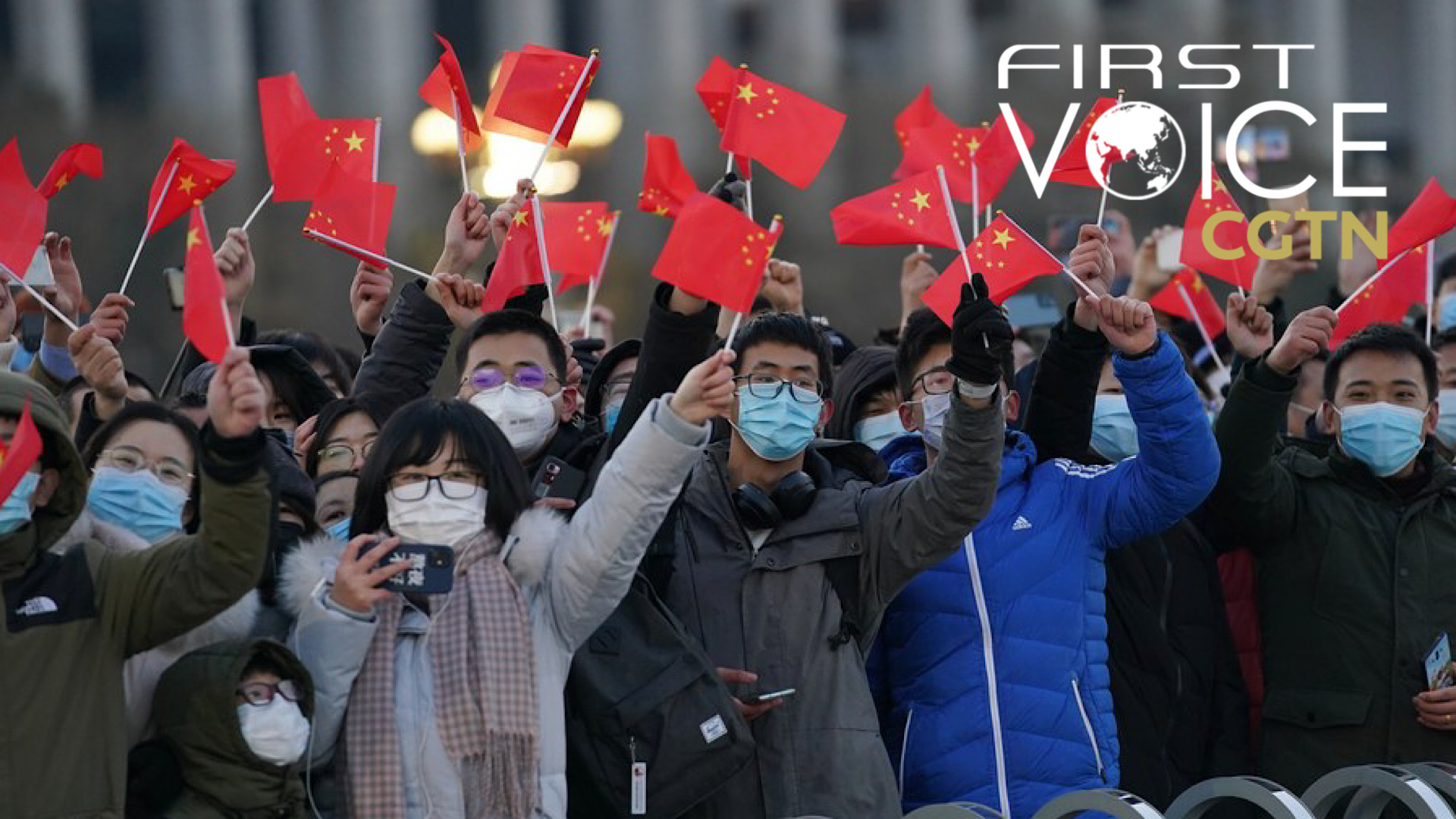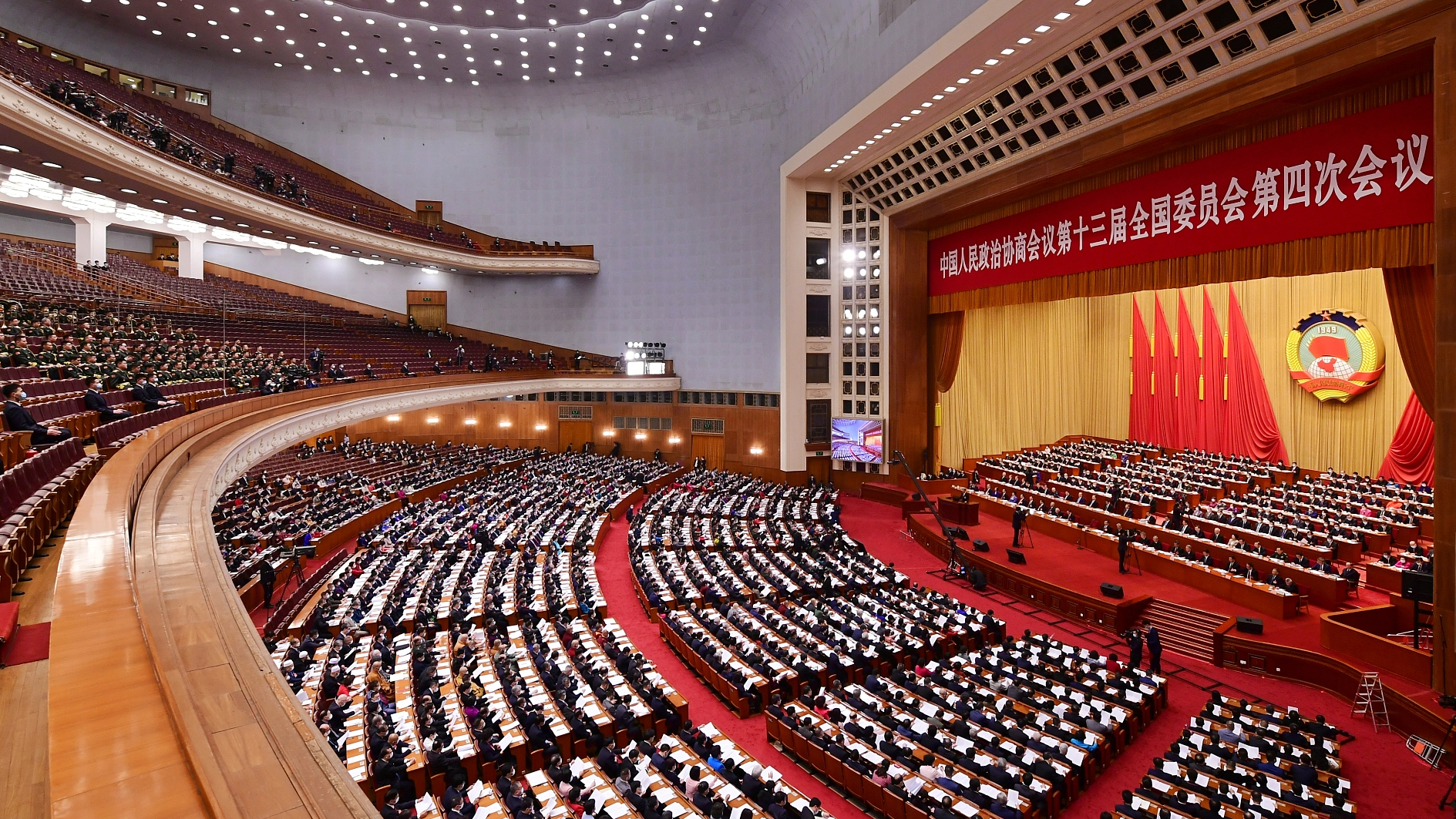
People wave Chinese national flags after a grand national flag-raising ceremony was held at the Tian'anmen Square in Beijing, China, January 1, 2021. /Xinhua
People wave Chinese national flags after a grand national flag-raising ceremony was held at the Tian'anmen Square in Beijing, China, January 1, 2021. /Xinhua
Editor's note: CGTN's First Voice provides instant commentary on breaking stories. The daily column clarifies emerging issues and better defines the news agenda, offering a Chinese perspective on the latest global events.
In line with the 100th anniversary of the founding of the Communist Party of China (CPC), China issued a white paper on Friday detailing "China's Political Party System: Cooperation and Consultation."
It comes amid an attempt by some countries to wage ideological warfare on China and, using the rhetoric of human rights as a pretext to interfere in China's internal affairs and force their vision onto the country. Not only does this fail to understand China's political system, it is not an honest or fair depiction of the CPC's record.
In reality, China's political system has proved itself flexible in adapting to local political conditions and serving the best needs of the country's development. As the paper sets out, "The system best suited to a country is determined by its history, traditions, and realities. There are many types of political party system around the world, and there is not a single system that is good for all countries."
The CPC's exercising of state power doesn't mean "no" to democracy. Apart from the CPC, China's political party system includes eight other political parties and prominent individuals without affiliation to any of the political parties. The cooperation among them ensures voices from various fields are heard in the administration of state affairs.
Consultation is vital in China's policy-making process. Other parties and non-affiliates can put forward their advice via multiple channels, including the internet. For instance, before adopting the proposals for the formulation of the 14th Five-Year Plan for National Economic and Social Development and the Long-Range Objectives Through to the Year 2035, China's legislative body generated more than a million responses from netizens.
Non-CPC political parties conduct targeted research on major issues of economic and social development on a regular basis. Their representatives are invited to sit in on relevant conferences to advise and participate in specialized field work, inspection, and supervision.

The fourth session of the 13th Chinese People's Political Consultative Conference is held in the Great Hall of the People in Beijing, China, March 4, 2020. /VCG
The fourth session of the 13th Chinese People's Political Consultative Conference is held in the Great Hall of the People in Beijing, China, March 4, 2020. /VCG
A successful political model is not all about dogma, as assumed in classical liberty, but is also premised on the ability of that state to truly cater to the best interests of the people, adapt to needs, improve the standard of living, combat poverty and adhere to the welfare of all.
China's democracy is not about the theatre and drama of elections but on the principle that democracy is weighed by economic rights, which in turn are human rights. Under the current political party system, China has been transformed from being a backward agrarian impoverished nation into the world's second-largest economy in a rapid way and in a relatively short period of time.
Human flourishing is not just about being "politically free" – you can have what is called "classical liberty," that is, the absence of government and restraint, yet be poor, economically subjugated and without opportunity. Are many people in America "free" when they have no means to escape from poverty?
When the Communist Party of China first came to power in 1949, China was an undeveloped, agrarian country dominated by a peasantry controlled by a small landlord class. In 1952, its gross domestic product was just 67.9 billion yuan ($9.55 billion). That is less than a third-tier city's performance alone in today's China. In 1949, the average lifespan in the country was just 35 years old. Today, the figure jumped to 77.3.
The white paper shows that the implementation of CPC policies produced an outstanding transformation in people's life prospects and quality. From 1956 to 2020, disposable household income increased from just 98 yuan ($15) to 32,189 yuan ($4,991).
The tight cooperation between the CPC and other political parties has enabled China to pool all resources necessary for the national goals. Apart from economic growth, China announced that it had eradicated extreme poverty nationwide in 2020. In the meantime, China's efficiency and mobilization in the fight against the COVID-19 pandemic impressed the world. These are a result of the well-functioning of China's multiparty cooperation system.
China has proposed a different vision of democracy to achieve a successful country, in contrast to the Western model, adapted firmly to Chinese conditions. As demonstrated by the upheaval, chaos and instability which rocked China in the pre-Communist era, Western liberal democracy was an ill-suited system for the country. Subsequently, the CPC has built its rule upon these historical tragedies and disruptions to articulate a system on behalf of the people, utilizing scientific result-orientated measures.
As the saying goes, "if it ain't broke, don't fix it."
(If you want to contribute and have specific expertise, please contact us at opinions@cgtn.com.)

